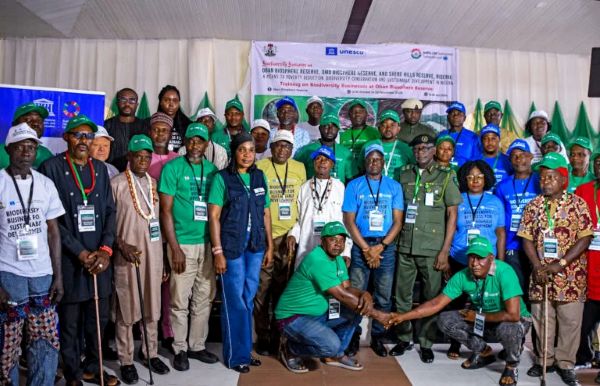The United Nations Educational, Scientific and Cultural Organization (UNESCO) is training members of Oban community in Cross River State on biodiversity enterprises aimed at conserving the Oban Biosphere Reserve and promoting sustainable development.
The training is part of the Nigeria–UNESCO Biodiversity Business Project in Oban Biosphere Reserve, Omo Biosphere Reserve, and Shere Hills Reserve, under the theme “A Means to Poverty Reduction, Biodiversity Conservation and Sustainable Development in Nigeria.”
The week-long programme brings together participants from 12 communities within the Oban area — Old Netim, Nsan, Obung, Ojor, Nsofang, New Ekuri, Old Ekuri, Neghe, Oban, Osomba, Orem and Ojok.
Funded by the India–UN Development Partnership Fund, the initiative is implemented in collaboration with the Nigerian Man and Biosphere (MAB) Committee, Forestry Research Institute of Nigeria (FRIN) and the National Park Service (NPS).
Dr. Enang Moma, National Professional Officer, Natural Science Sector, UNESCO Abuja, said the training was designed to conserve biodiversity and create wealth through biodiversity-based enterprises.
“People depend on biodiversity for their livelihoods, but it has to be done sustainably,” Moma said. “Biodiversity supports climate change adaptation, food production and livelihood security. This project will help communities utilise biodiversity in ways that protect it, while improving incomes and reducing poverty. We are also promoting women and youth entrepreneurship for inclusivity.”
Moma explained that about five persons would be trained from each family, adding that the pilot project would reach approximately 2,500 people.
Minister of Environment, Mr. Balarabe Lawal, said the training would enable communities to benefit from the sustainable use of natural resources while preserving the ecological integrity of their environment.
Represented by Dr. Zacharia Yaduma, Director-General of FRIN, the minister noted that environmental education deepens understanding of ecological systems and encourages community stewardship.
“Livelihood development and business management are integrated into this project as vital tools for sustainability,” he said. “By equipping participants with management and entrepreneurial skills, we are promoting nature-based businesses that add value to local resources, alleviate poverty, and support sustainable production.”
Traditional Ruler of Oban community, Mr. Ignatius Ndifon, urged participants to take the training seriously, describing the Oban forest as part of their ancestral heritage. He called on women and youths to become champions for forest preservation.
Also speaking, Dr. Ibrahim Goni, Conservator-General of the National Park Service, represented by CP Joseph Ntui, Conservator of the Cross River National Park, advised the communities to apply the knowledge gained towards biodiversity conservation and to support the park’s protection efforts.
Participants will receive training in biodiversity business management, record keeping, piggery, fish farming, and poultry biodiversity enterprises.


